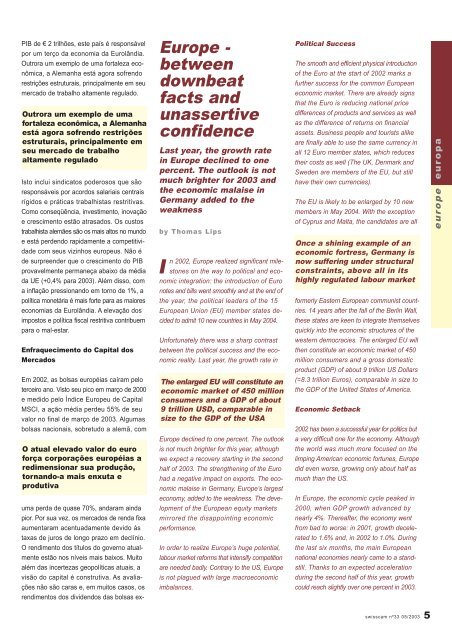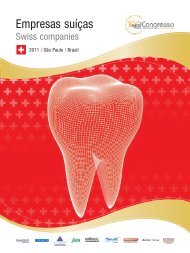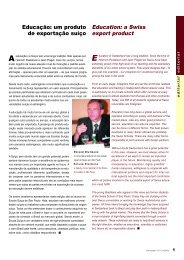Create successful ePaper yourself
Turn your PDF publications into a flip-book with our unique Google optimized e-Paper software.
PIB de € 2 trilhões, este país é responsável<br />
por um terço da economia da Eurolândia.<br />
Outrora um exemplo de uma fortaleza econômica,<br />
a Alemanha está agora sofren<strong>do</strong><br />
restrições estruturais, principalmente em seu<br />
merca<strong>do</strong> de trabalho altamente regula<strong>do</strong>.<br />
Outrora um exemplo de uma<br />
fortaleza econômica, a Alemanha<br />
está agora sofren<strong>do</strong> restrições<br />
estruturais, principalmente em<br />
seu merca<strong>do</strong> de trabalho<br />
altamente regula<strong>do</strong><br />
Isto inclui sindicatos poderosos que são<br />
responsáveis por acor<strong>do</strong>s salariais centrais<br />
rígi<strong>do</strong>s e práticas trabalhistas restritivas.<br />
Como conseqüência, investimento, inovação<br />
e crescimento estão atrasa<strong>do</strong>s. Os custos<br />
trabalhista alemães são os mais altos no mun<strong>do</strong><br />
e está perden<strong>do</strong> rapidamente a competitividade<br />
com seus vizinhos europeus. Não é<br />
de surpreender que o crescimento <strong>do</strong> PIB<br />
provavelmente permaneça abaixo da média<br />
da UE (+0,4% para 2003). Além disso, com<br />
a inflação pressionan<strong>do</strong> em torno de 1%, a<br />
política monetária é mais forte para as maiores<br />
economias da Eurolândia. A elevação <strong>do</strong>s<br />
impostos e política fiscal restritiva contribuem<br />
para o mal-estar.<br />
Enfraquecimento <strong>do</strong> Capital <strong>do</strong>s<br />
Merca<strong>do</strong>s<br />
Em 2002, as bolsas européias caíram pelo<br />
terceiro ano. Visto seu pico em março de 2000<br />
e medi<strong>do</strong> pelo Índice Europeu de Capital<br />
MSCI, a ação média perdeu 55% de seu<br />
valor no final de março de 2003. Algumas<br />
bolsas nacionais, sobretu<strong>do</strong> a alemã, com<br />
O atual eleva<strong>do</strong> valor <strong>do</strong> euro<br />
força corporações européias a<br />
redimensionar sua produção,<br />
tornan<strong>do</strong>-a mais enxuta e<br />
produtiva<br />
uma perda de quase 70%, andaram ainda<br />
pior. Por sua vez, os merca<strong>do</strong>s de renda fixa<br />
aumentaram acentuadamente devi<strong>do</strong> às<br />
taxas de juros de longo prazo em declínio.<br />
O rendimento <strong>do</strong>s títulos <strong>do</strong> governo atualmente<br />
estão nos níveis mais baixos. Muito<br />
além das incertezas geopolíticas atuais, a<br />
visão <strong>do</strong> capital é construtiva. As avaliações<br />
não são caras e, em muitos casos, os<br />
rendimentos <strong>do</strong>s dividen<strong>do</strong>s das bolsas ex-<br />
Europe -<br />
between<br />
<strong>do</strong>wnbeat<br />
facts and<br />
unassertive<br />
confidence<br />
Last year, the growth rate<br />
in Europe declined to one<br />
percent. The outlook is not<br />
much brighter for 2003 and<br />
the economic malaise in<br />
Germany added to the<br />
weakness<br />
by Thomas Lips<br />
I<br />
n 2002, Europe realized significant milestones<br />
on the way to political and economic<br />
integration: the introduction of Euro<br />
notes and bills went smoothly and at the end of<br />
the year, the political leaders of the 15<br />
European Union (EU) member states decided<br />
to admit 10 new countries in May 2004.<br />
Unfortunately there was a sharp contrast<br />
between the political success and the economic<br />
reality. Last year, the growth rate in<br />
The enlarged EU will constitute an<br />
economic market of 450 million<br />
consumers and a GDP of about<br />
9 trillion USD, comparable in<br />
size to the GDP of the USA<br />
Europe declined to one percent. The outlook<br />
is not much brighter for this year, although<br />
we expect a recovery starting in the second<br />
half of 2003. The strengthening of the Euro<br />
had a negative impact on exports. The economic<br />
malaise in Germany, Europe’s largest<br />
economy, added to the weakness. The development<br />
of the European equity markets<br />
mirrored the disappointing economic<br />
performance.<br />
In order to realize Europe’s huge potential,<br />
labour market reforms that intensify competition<br />
are needed badly. Contrary to the US, Europe<br />
is not plagued with large macroeconomic<br />
imbalances.<br />
Political Success<br />
The smooth and efficient physical introduction<br />
of the Euro at the start of 2002 marks a<br />
further success for the common European<br />
economic market. There are already signs<br />
that the Euro is reducing national price<br />
differences of products and services as well<br />
as the difference of returns on financial<br />
assets. Business people and tourists alike<br />
are finally able to use the same currency in<br />
all 12 Euro member states, which reduces<br />
their costs as well (The UK, Denmark and<br />
Sweden are members of the EU, but still<br />
have their own currencies).<br />
The EU is likely to be enlarged by 10 new<br />
members in May 2004. With the exception<br />
of Cyprus and Malta, the candidates are all<br />
Once a shining example of an<br />
economic fortress, Germany is<br />
now suffering under structural<br />
constraints, above all in its<br />
highly regulated labour market<br />
formerly Eastern European communist countries.<br />
14 years after the fall of the Berlin Wall,<br />
these states are keen to integrate themselves<br />
quickly into the economic structures of the<br />
western democracies. The enlarged EU will<br />
then constitute an economic market of 450<br />
million consumers and a gross <strong>do</strong>mestic<br />
product (GDP) of about 9 trillion US Dollars<br />
(=8.3 trillion Euros), comparable in size to<br />
the GDP of the United States of America.<br />
Economic Setback<br />
2002 has been a successful year for politics but<br />
a very difficult one for the economy. Although<br />
the world was much more focused on the<br />
limping American economic fortunes, Europe<br />
did even worse, growing only about half as<br />
much than the US.<br />
In Europe, the economic cycle peaked in<br />
2000, when GDP growth advanced by<br />
nearly 4%. Thereafter, the economy went<br />
from bad to worse: in 2001, growth decelerated<br />
to 1.6% and, in 2002 to 1.0%. During<br />
the last six months, the main European<br />
national economies nearly came to a standstill.<br />
Thanks to an expected acceleration<br />
during the second half of this year, growth<br />
could reach slightly over one percent in 2003.<br />
europa<br />
europe<br />
swisscam nº33 05/2003 5
















